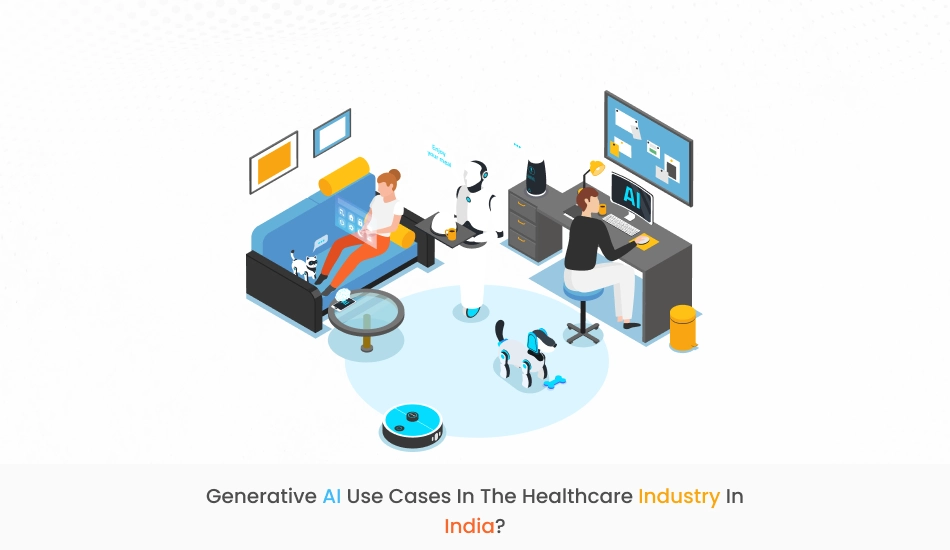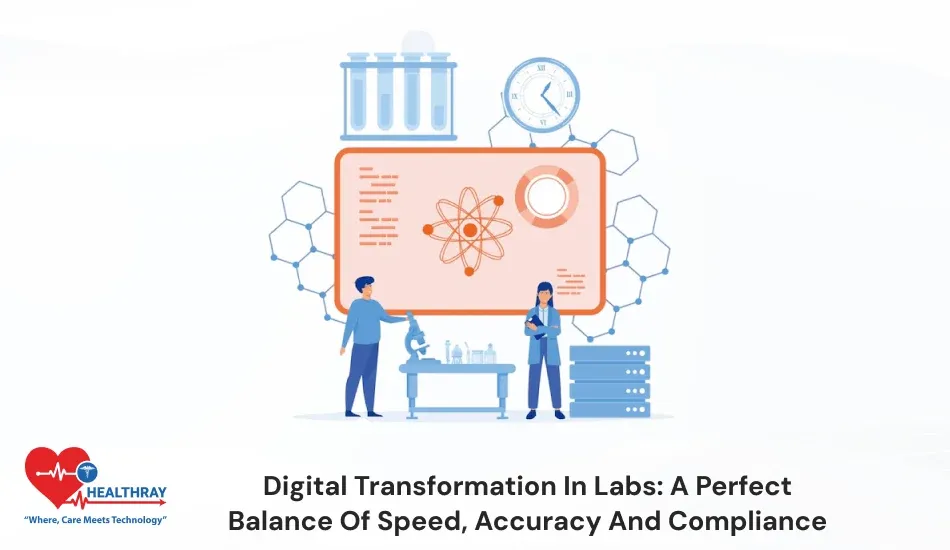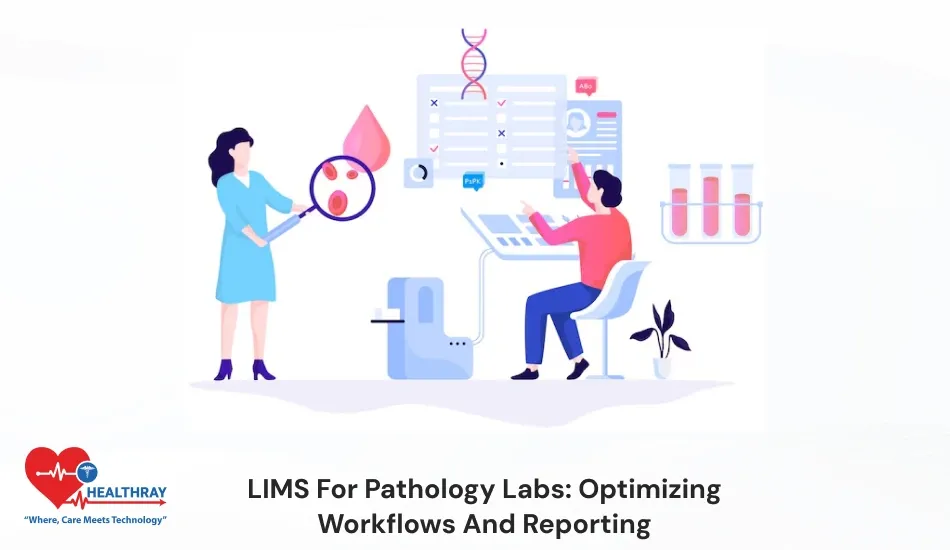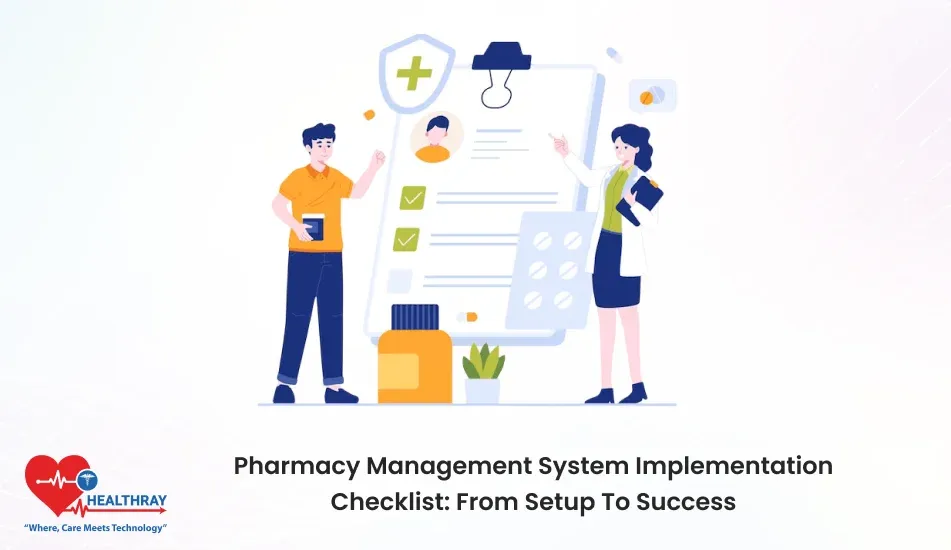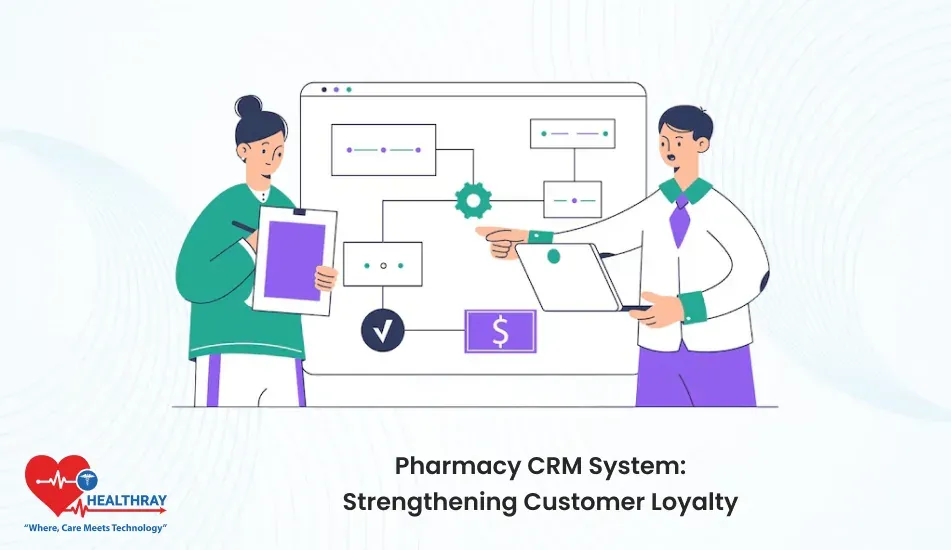Quick Summary
AI integration in the healthcare industry in India has a considerable impact which enhances overall hospital efficiency from precise diagnosis to facilitating the telemedicine platform. Aid in enhancing patient involvement, smooth operational tasks, healthcare regulation adherence, and many more. Beneficial for overcoming healthcare hurdles for improving hospital efficacy, up-scaling healthcare financial performance, and assisting in workflow optimization.
Introduction
In the recent era, the use of AI (Artificial Intelligence) is vast due to its advanced features and AI in healthcare changes the entire healthcare delivery scenario from patient handling to maintaining hospital staff effectively. It has a significant impact on conducting hospital operations from maintaining patient data to accurate diagnosis. Moreover, Hospital Management Software provides the feature of image capturing that helps in disease analysis and to know exact recovery reports.
The automated healthcare industry in India has had a tremendous effect on the growth of the economy. This platform helps in maintaining sustainability, resulting in a healthier environment, increasing the individual age, and maintaining contribution towards the development of the Indian economy. Enhancing optimistic behavior among patients and building their confidence in the healthcare community.
We provide ease in healthcare workload by incorporating advanced AI technologies and providing a comprehensive platform that can easily be used by any individual whether they are rural or old-age. Also, saves tons of time for both healthcare providers and patients.
Addressing Healthcare Challenges with AI integration
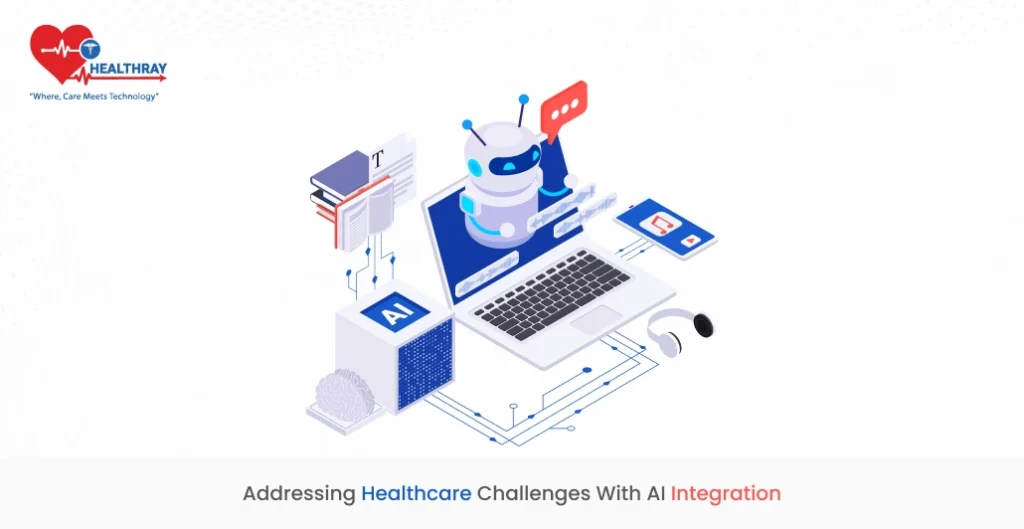
Incorporation of AI Technologies in overcoming healthcare challenges and transforming healthcare in an advanced way, enabling healthcare facilities to be everywhere regardless of any location and time. Most of the time patients are too lazy to stand in queues resulting in developing a critical healthcare disease and they might lose their life.
In our daily lives, we hear more of the death news related to low blood pressure, increasing sugar, and increasing different diseases such as tuberculosis, and pneumonia. Sometimes, people end their lives with just high fever. With Healthray, it’s easy to schedule appointments online and get medication reminders for effective patient outcomes.
Moreover, it’s time to adopt AI in healthcare, which helps in reducing the healthcare workload and eradicate paperwork to reduce stress regarding maintaining historical records. Also, assists in predictive analysis, which might be impossible in traditional healthcare. To know more about addressing healthcare challenges, look out the below points :
Difficulty in Diagnostics :
Timely Diagnostics is a crucial aspect in every healthcare for better patient treatment and helps in fast patient recovery. It helps in image capturing such as MRI reports, CT Scans, and X-Ray, compiling healthcare patient’s records with their medical history and vital signs. Moreover, It supports the entire collection of hospital data.
After that, data processing in an organized way helps in easy navigation and analysis in an effective visual format that can be understood by each individual. Incorporating AI algorithms for better and faster diagnostics might save patients lives and support speedy patient recovery.
Custom Generative AI solutions helps to analyze critical diseases such as tuberculosis and osteoporosis. We consider one disease and analyze how this helps in accurate diagnostics. We take the Tuberculosis disease. First, it requires compiling of required data such as X-ray images, GeneXPert test, and sputum test. which makes it difficult to examine all records physically, however, it is easy to analyze in digital healthcare mode.
Furthermore, timely diagnosis supports in achieving better treatment and patient outcomes. It helps in effective patient treatment and supports in minimizing the healthcare risks and less chances of spreading the disease. Overall, maintains a healthy lifestyle in the current landscape.
Challenges in Prognostic Analytics :
This refers to anticipating healthcare outcomes based on historical medical data with in-depth healthcare reports. Moreover, it offers healthcare analytics reports in a graphical format such as bar graphs, pie-charts, and tabular format, which are easy to compare and helpful in severe monitoring of critical disease.
Moreover, AI systems assist in forecasting patient conditions after analyzing the disease. Healthcare providers help them to organize the clinical equipment data and maintain the re-order level.
Furthermore, Artificial Intelligence forecasts accurate patient outcomes through data collection of medical data with their historical records, laboratory results, capturing radiology images and patient demographics. After that, This supports the process of cleaning healthcare data and ensures data quality, removing medical errors and depicting those data in a different and organized manner.
Then, AI technology selects the model such as a decision tree and neural networks, as it depends on the data type and specific purpose of data.
Lastly, This supports analyzing data in a convenient format that is easily understood by healthcare professionals and also patients. Patients can also make proactive decisions for better healthcare recovery, maintaining a healthy lifestyle, and reducing the chances of critical disease. In the recent healthcare sector, Most people have been using Healthray to predict health outcomes and increase patient care to the next level.
Obstacles in Patient Care :
AI in healthcare assists in satisfying individual patients’ needs and their requirements. Every patient has unique surroundings, lifestyle, and body requirements. It requires lots of effort and specialist time for patient care. Generally, every healthcare provider does not have enough time to draft detailed reports and compile whole historical records which might be challenging tasks. With Healthray, it’s easy to patient care and enhance their healthcare experience, which is a daunting one in traditional healthcare.
Moreover, we ease the administrative tasks that turn to saving time for patient care. Facilitates remote health monitoring for healthcare providers and patients. Healthcare providers can enhance interaction among different specialists and refer to them when needed. Also, assist in charging commissions and set up an electronic way to earn revenue income.
Hospital Management System Software in Healthcare effective in medical practices through in-depth medical reporting, and real-time patient tracking for accurate diagnosis and better healthcare delivery. Therefore, it supports increasing patient numbers in the hospital. Also, assists in medical record management effectively and fosters better healthcare collaboration tools.
Troubling with Paper-Based System :
Maintaining Healthcare records in the digital format which incorporates medical billing, prescription management, patient records management, virtual health assistant, and more. Medical billing in the electronic format helps in adherence to healthcare regulations, lowers penalty risks and enhances the capabilities of medical financial budgeting for patients. also, benefited hospitals to maintain transparency and healthcare accounts.
Furthermore, Helps to conduct smooth clinical practice through healthcare automation as it assists in decreasing operational workload, eradicating paper records, and requiring less healthcare staff. Ultimately, assists in reducing hospital expenses and enhancing financial hospital performance. It is a great platform for easily identifying and analyzing diseases at a deeper level. Also, it is easy to anticipate and plan for patient outcomes.
Electronic Health Records support capturing radiology images and enhance diagnostics practice, even at your home. Facilitates understanding complicated healthcare reports in an easy format and helps in precise treatment.
Time Consuming :
In this modern time, most people do online shopping then why not use online treatment that saves most of the crucial time? Most of the patients had to leave the office for minor health issues. Moreover, they stand for long hours in queues to book appointments, consult doctors, and receive reports. Sometimes, patients have to wait for hours just to verify the medicines and report checking.
To solve this challenge, we are coming up with a comprehensive Healthray platform, which is not only for healthcare providers but also for patients. Also, they have integration with different healthcare departments such as laboratories and pharmaceuticals.
Furthermore, It directly affects the patient’s outward and inward in the hospital and financial healthcare performance. Consequently, the digital healthcare industry in India affects the betterment of the whole society. As people are healthier, they have more potential to create more start-ups and contribute toward the growth of the Indian economy.
Consequently, the Improved healthcare industry in India, through AI integration, assists in overcoming the most challenging part of traditional healthcare: time-consuming healthcare activities, which waste a lot of patients’ time in unnecessary activities.
It helps in better patient outcomes as patients have more to focus on their required health activities such as maintaining a food diet and experiencing different healthcare providers for better healthcare knowledge. Also, they can implement proactive decisions for curing critical diseases and creating a better environment among healthcare professionals.
Difficulty in Radiology Images :
It refers to image capturing of radiology images such as X-rays, MRI, and CT-scan. Examining them with AI technologies is the next level of healthcare treatment which can help in predictive analysis.
This helps to get clearer radiology images for better treatment outcomes and this requires no chemicals required to make a visible image. This procedure is undergone with several steps. Firstly, they used some chemicals like developer, fixer, and more. Secondly, use a rinsing procedure. Lastly, fix and dry the films.
Moreover, To reduce this complicated and time-consuming procedure. We provide a comprehensive solution that assists in capturing the radiology images in an organized manner. Electronic radiology uses digital sensors for capturing X-ray, MRI, and Ct-Scan images. This is a time-efficient process and doesn’t require any specialized equipment. Moreover, it also supports analyzing radiology images from home and sharing the medical information with other specialists for different experiences, and it’s always best to get another specialist’s or doctor’s opinion.
Furthermore, there are uncountable advantages that are difficult in the traditional healthcare system. Digital radiology supports speeding up the treatment procedure because it helps to get instant visual images without undergoing any paper radiology procedure. Also, healthcare providers can view the records earlier and start the treatment faster. It is to be seen that the digital radiology images have better quality and support in increasing the viewing size as required for better analysis.
Enhanced Healthcare Costs :
Maintaining clinical data is a tough task for hospitals. Medical staff always have overloaded work, sometimes this creates an overwhelming environment among healthcare staff. It has to be seen that they ignored most of the patient’s queries and neglected them. Consequently, reducing patient engagement in hospitals decreases hospital revenue and affects the whole hospital’s performance.
Moreover, AI use cases healthcare in India requires less healthcare resources which decreases the amount of hospital expenses and increases the flow of healthcare income. Moreover, saving expenses helps to increase the spending capacity of doctors and maintain their higher standard level. Also, this eases the healthcare work tasks from making healthcare reports to digital billing. Manually drafting bills or generating them through basic computer programs would not assist in adherence to healthcare. regulations and are troublesome for them to maintain continually. Consequently, it increases the penalty chances.
This supports the overall improvement of healthcare in the Indian economy, enhances the production capacity, and contributes to the GDP of India. Increasing patient engagement creates more healthcare job opportunities that turn to enhancing the living standard of people and reducing poverty in India.
Health Monitoring :
Electronic Monitoring plays a crucial role in the digitized healthcare ecosystem. Incorporation with EHR (Electronic Health Record) provides accurate diagnostics as it helps centralize entire medical information on one platform.
Data collection from different incorporated systems such as the patient engagement system which includes entire demographic information, medical history, vital signs, and symptoms. After that, data is processed which cleans the error and maintains an organized form of healthcare data that is easy to navigate. Consequently, AI in healthcare helps in monitoring entire patient healthcare data for better health outcomes.
Moreover, AI in healthcare supports visualizing healthcare in different formats such as pie charts, bar graphs, and dashboards for understanding the data in a better manner. It improves healthcare accessibility to each part of the country, especially in those areas where it’s difficult to provide healthcare facilities.
It’s time to adopt the new healthcare technologies like Healthray and make our India, a healthier economy. Healthcare Monitoring helps in detecting health-critical issues. Also, able to maintain health virtually through remote monitoring from any digital devices such as tablets, mobile phones, and laptops.
AI in healthcare fosters better management of critical diseases such as Migraine, sugar, heart disease, and blood pressure. It is crucial to monitor these critical diseases regularly as if it’s not regularly monitored, there is a higher risk of severe conditions and death of the individual. It guarantees that patients will be more satisfied with the treatment if you adopt a digital healthcare platform. Also, Helps in overcoming healthcare challenging situations regarding patient safety and managing critical diseases.
Not only provides a remote consultation facility but also has a solid integration with medical instruments and patient information. Furthermore, managers and stakeholders can monitor information from their comfort place and direct them in their wrong steps. Therefore, the hospital management system reduces risks, lowers average medical expenses, and lowers the stress level.
Increasing Patient Retention :
This is not just a healthcare challenge but also a hospital goal to higher patient retention rate and lower patient attrition rate. With traditional healthcare challenges where healthcare staff is burned out through more stressful healthcare work related to maintaining large medical files and difficulty in maintaining the healthcare records of each patient.
Troublesome to satisfy patients as there is no facility for virtual consultation and monitoring. With Healthray, it’s easy to maintain records, enhancing patient safety and timely care.
Electronic billing provides different payment options such as debit cards, credit cards, and UPIs. This helps in a speedy payment process and saves a lot of time through the eradication of queues. Moreover, this facilitates high-quality patient care. Most hospitals are using convenient methods to ease the patient’s procedure.
Now, it’s your time to turn the tables and attract patients like magnets into your hospital. Are you ready for your hospital transformation and achieving goals faster? Without Delay, adopt Healthray and achieve your hospital milestones.
In this current landscape, where patient requirements are higher and hospitals are not able to meet those requirements, leading to decreased patient retention. Once the patient is gone, it never comes back. Keep this one as your priority and contribute towards the nation.
This automatically helps to get patient feedback which enhances patient contentment and supports their active participation in healthcare activities. Also, machine learning maintains a sustainable environment solution by fostering the betterment of the Indian economy.
Embracing an advanced technique to increase great retention rate and satisfaction score, leading to increased income rate. Furthermore, it builds a long-lasting relationship with patients, decreases care expenses, improves clinical practice, and clients receive immediate consultation to reduce future risks. Additionally, it smooths the patient journey from entering to discharging from a healthcare organization.
Benefits of Artificial Intelligence In Healthcare
Artificial Intelligence in Healthcare has a revolutionary impact. Healthcare platforms synchronize with AI (Artificial Intelligence) and build a comprehensive platform for healthcare professionals and patients. This supports managing patient data, laboratory data with their order details, and maintaining the ledger for particular medicines and their records of each medication sale. Therefore, Machine learning algorithms are supported in digital healthcare. Numerous benefits that can’t described in fewer words, we are still trying to depict in some below points :
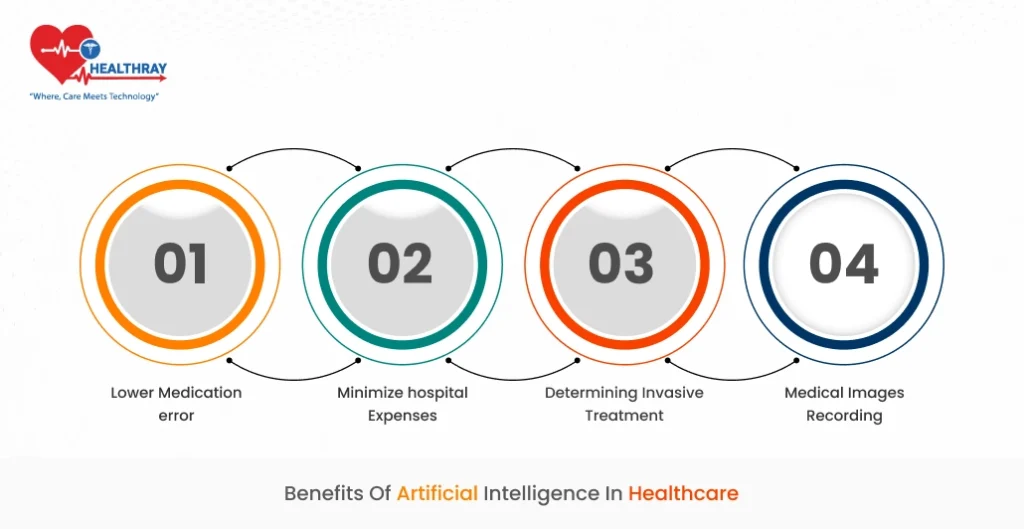
Lower Medication error :
Digital Healthcare Industry in India, fostering automation of hospital work while maintaining historical medical records. Achieving a higher level of patient satisfaction through timely healthcare procedures from patient information to medical billing. Also, maintains medication pre-documentation, which eases in the healthcare workflow. In the traditional healthcare system, it’s difficult to provide proper prescriptions with complete medical regulation.
Moreover, there are several side effects from wrong medication doses such as patient death, and disability, and may affect any organs of the body. There are many live cases of wrong medication. Therefore, many old people won’t like to visit doctors and take prescriptions, leading to the critical disease that leads to the death of the patients. Sometimes, Healthcare professionals are also in dilemma while writing prescriptions. To solve this trouble, We are fostering a digital healthcare platform to meet the needs of each healthcare provider and patient.
Integration electronic models provide the template in which compliance with Indian healthcare regulations decreases, and those templates are customizable. AI in healthcare supports the display of healthcare information as required by individual specialists. Therefore, Clinical documentation is easier, maintaining the drug parameters and tracking health regularly. Mainly, This is regarding frequency and alerts if there is any wrong dosage written by healthcare providers.
Minimize hospital Expenses :
Machine learning Algorithms support cut-down the hospital’s expenses such as decreasing recruitment and staffing costs. Also, ease in conducting healthcare training programs. This supports enhancing the financial hospital’s performance and maintaining a steady income flow. Manages resources effectively whether it’s professional and equipment resources. Artificial Intelligence in Healthcare Smooth clinical workflows through electronic mode, which automates the whole healthcare system such as scheduling appointments and drafting medical bills. Also, AI in healthcare maintains inventory with precise details.
AI in healthcare supports managing staff effectively through HRMS (Human Resource Management System) integration. Machine learning aids in monitoring staff performance and assigning them tasks. Also, this supports payroll management that includes employee information, basic salary, gross salary, and basic taxation rules. Consequently, follow taxation policies and track their attendance with overtime hours. Thus, simplifying the payment process. Artificial Intelligence manages inventory effectively through continuous monitoring and maintains data in an organized manner, which helps to maintain lab financial accounts.
Deep learning algorithms ease image capturing such as X-rays, CT- scans, and other radiology images. These are very advanced models that can predict future outcomes through in-depth analysis, and assist in detecting breast cancer, bone fractures, brain clots, and more.
Determining Invasive Treatment :
Machine learning algorithms easily analyze entire patient data with their medical history and radiology images. Easy to monitor a patient’s progressive performance, and helpful in detecting any healthcare risks and future outcomes. Deep learning algorithms support forecasting healthcare risks and can surveillance disease progression. This is most helpful for surgeons to understand critical diseases and operate effectively, simplifying complex cases by clear image quality and being able to zoom in and zoom out as per requirement. Also, AI in healthcare fosters guidance for avoiding complications at the surgery time.
Machine learning provides precision medicine and effective patient outcomes. It helps in the healthcare analysis of big data sets into a simplified form that can be understood by any junior healthcare professional. Identifying severe healthcare issues through systematic Artificial Intelligence procedures from storing medical data with their billing information, and processing data in a simpler and organized manner, which aids in navigating easily and facilitates healthcare training.
Deep learning algorithms aid Neurosurgeons in several ways as they help in analyzing MRI and CT-scan reports and ease in determining tumors, migraine problems, or any other deviation happening in the brain. AI in healthcare supports navigating the disease and makes easy decisions related to which part is removed and which is left out as it is crucial while treating chronic diseases like tumors, which are likely to be spread in the future.
Medical Images Recording :
Deep learning algorithms can capture medical images in the electronic form that are created through digital sensors in less time with no equipment required. In the traditional healthcare system, film processing took more time and also required equipment.
They use chemicals that are harmful to the health and it requires lots of attention while applying these chemicals. Moreover, it causes reactions such as skin disease, and respiratory problems and might be getting severe injury.
Furthermore, chemicals adversely affect the environment as they use lots of water and soil, leading to decreased sustainability. It enhances hospital expenses and troublesome film processing. Therefore, enhances recruitment and training expenses. Physical medical records require proper documentation which also increases labor workload. This provided less healthcare access and difficulty sharing reports with other specialists. Therefore, they are relying on single hospital software providers.
In contrast, Deep learning has a revolutionary impact on medical recording systems and advanced healthcare tools fostering precise image resolution, which helps in prompt decision-making and detailed image support in treatment outcomes. Additionally, AI in healthcare is fostering image segmentation for identifying cancerous tissues. Consequently, ease in patient outcome and accurate diagnosis.
Results Driven From AI Use Cases
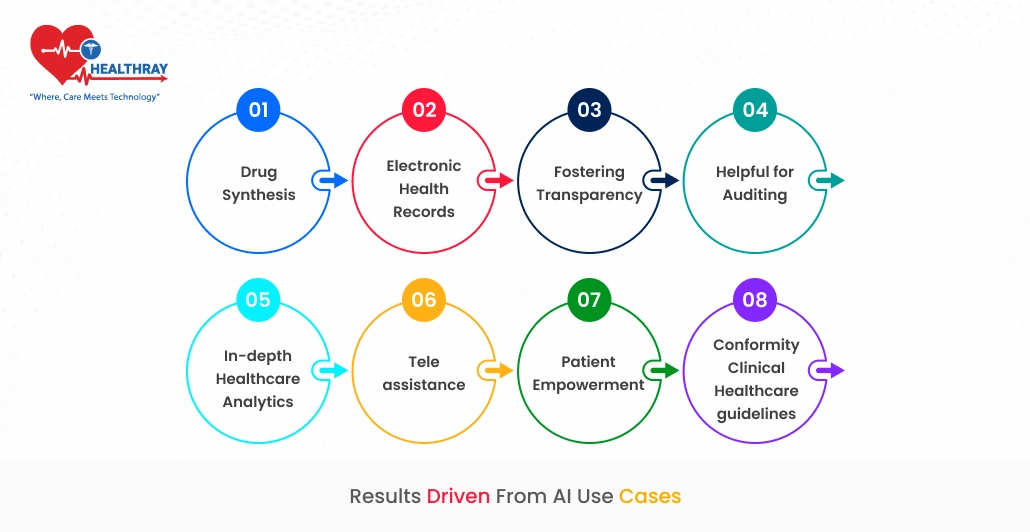
Drug Synthesis :
AI in healthcare plays a crucial role in drug discovery and development. Deep learning models analyze big data sets and provide data in the dashboards for predicting future treatment outcomes.
Through in-depth analysis of whole patient records and identifying more prevalent diseases, resulting in drug development and accordingly drug designing. It saves time and drugs come into the market earlier, which helps in fast patient recovery and reduces costs. Deep learning makes it easy to understand the drug requirement which saves a lot of patient life.
Machine learning supports analyzing different data such as genomic data, metabolomic data, and other biological data and chemical data. After that, this data is processed in an organized manner and provides better reports in an easy format that minimizes the chances of drug failure. Furthermore, Deep learning algorithms support personalized patient care through drug development for individual patients. This platform maintains historical patient records with their demographics and vital signs information.
Deep learning assists in the drug process with the mixture of exact ingredients, minimizing the chances of side effects and speedy recovery from disease. Helpful for treating several medical conditions and decreases the risks of chronic diseases. Researchers can design precise compounds through concise healthcare reports. Thus, it reduces the adverse side effects, effective patient treatment, and elevates patient safety.
Electronic Health Records :
Deep learning supports the optimization of clinical trials by minimizing hospital expenses and increasing the revenue of healthcare income. Ease the work of clinical processes including scheduling appointments, and reminders to patients and doctors, and facilitate medical billing. Furthermore, it serves as a healthcare collaboration platform where different healthcare professionals meet and expand their services. Consequently, Artificial intelligence enhances healthcare revenue generation.
Machine learning provides in-depth healthcare analytics in a graphical format that makes it easy to analyze healthcare reports and take proactive decisions to minimize chronic risks. This provides centralized healthcare information including patient medical history with their vital signs and occurring symptoms and radiology images with greater quality for increasing precision decisions.
Machine learning assists in medical billing from appointment billing, and laboratory test results to the medicinal bill. Artificial Intelligence increases collaboration with different healthcare departments such as laboratory management systems and pharmacy management systems. Consequently, helpful for the accountant department as it assists in getting accurate expenses and income generated.
EHR (Electronic Health Record) undertakes substantial integration projects for enhanced healthcare communication and decision-making capabilities for effective patient outcomes. Incorporating artificial intelligence in EHR helps share information with anyone from any location and decreases patient confusion and miscommunication.
Fostering Transparency :
Artificial Intelligence in healthcare builds patient’s confidence and their faith in healthcare organizations through sharing their sensitive information with stakeholders and it helps to maintain transparency among them. Artificial Intelligence allows patients to view their health records and clear healthcare information, resulting in better treatment outcomes.
This provides price transparency and supports informed decision-making regarding healthcare costs and makes it easy for them to compare different healthcare provider costs. Artificial intelligence provides medical billing in a digital format that helps to record financial transactions. consequently, supporting patients to formulate medical budgeting and easy to maintain health. Patients can make their own choices by comparing different pricing strategies.
Helpful for Auditing :
Artificial Intelligence plays a crucial role in accounting healthcare transactions. Clinical Automation reduces human workload and duplicate tasks. Consequently, enhancing healthcare quality services and widening healthcare delivery. increasing healthcare productivity by reducing the clinical work of healthcare staff.
Artificial Intelligence offers a wide range of capabilities that are not possible in traditional healthcare. Also, it supports auditing and facilitates precise financial statements with proper ledger accounts.
Machine learning has vast capabilities that reduce time-consuming operational activities, help to achieve hospital goals, and enhance their financial performance. Providing real-time healthcare data and graphical reports through natural language processing.
Additionally, Optimizing accountancy work such as automated processing of order details, and equipment information with their maintenance time and usage data. Maintaining exact reports of bills payable and trade receivables. Therefore, assists in building good relations between suppliers and vendors. Also, Machine learning has the power to calculate the equipment age.
In-depth Healthcare Analytics :
The Artificial Intelligence Hospital Management Software In India a offers in-depth data analysis by integrating clinical data, patient’s history with current data, and medical financial data. consequently, it provides a meaningful conclusion with graphical elements. Helps to analyze the vast data for early detection of critical diseases and minimize downtime. Furthermore, Controlling to spread of illness by taking proactive action such as drug processes and gaining meaningful insights for better patient outcomes.
Powerful tools for data collection go to big data and processing that data to get insights and easy to interpret the complex healthcare structure. Artificial Intelligence supports informed decision-making for faster patient recovery. It is a reliable analysis as it is based on evidence-proof data. Not only is it helpful for patient treatment, but supports elevating operational efficiency. Thus, achieving the faster healthcare objective and minimizing hospital expenses.
Tele-assistance :
Artificial Intelligence allows healthcare providers to treat patients from any remote location. Not only just treat, but they can monitor their performance regularly. Indirectly, it impacts controlling chronic disease through the incorporation of AI systems.
Furthermore, It provides more work flexibility in the healthcare system and opportunities for yielding more revenue. Capturing radiology images is like extra butter on the bread, this supports minimizing medical costs which include film development, and reduces healthcare staff workload.
Machine learning benefited different specialists such as dermatologists, cardiologists, endocrinologists, orthopaedists, and more. This supports chronic conditions related to heart attack, skin disease, hyper-hypo thyroid, and fractures. Aid in guiding patients in emergency conditions and widely accessible healthcare facilities.
Patient Empowerment :
Integration of Artificial intelligence tools collecting whole data and organizing in such a way that ease in navigation. Empower patients to actively participate in their healthcare, they are more serious about their health after viewing reports and monitoring their health regularly. These advanced systems satisfy patient’s requirements and comfort them with maintaining their healthier lifestyle. Artificial intelligence in the healthcare industry in India is the base for economic modernization and maintaining a healthier environment.
Conformity Clinical Healthcare guidelines :
Artificial Intelligence adherence to entire healthcare guidelines supports improving patient quality and enhancing their satisfaction to the next level. Complying with the entire healthcare guidelines reduces the risk of penalties and severe cases, and the hospital may be ceased. It’s crucial to adhere to medical billing guidelines, prescription guidelines, medicinal guidelines, and more. Healthcare organizations don’t have enough time for proper framing and complying with guidelines continually. Therefore, Nowadays in India, healthcare organizations adopt AI systems to avoid future conflict and court cases.
Conclusion
Lastly, Artificial Intelligence in the healthcare industry in India has a profound impact on overcoming healthcare challenges such as difficulty in diagnostics, predictive analytics, patient care, and more. Consequently, enhancing patient quality care and their level of satisfaction. Healthcare departmental collaboration tool for seamless integration with different specialists such dermatologists, cardiologists, endocrinologists, orthopaedists, and more. Therefore, assists in yielding side income through telemedicine and virtual monitoring functionalities. Mainly, Artificial Intelligence supports drug development for minimizing critical diseases. Assist in fast patient recovery and avoiding law penalties by adherence to healthcare guidelines.
